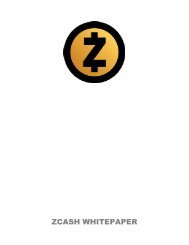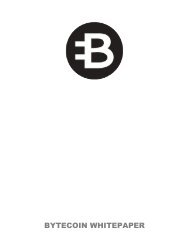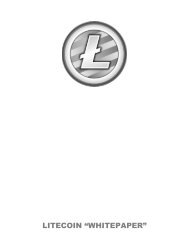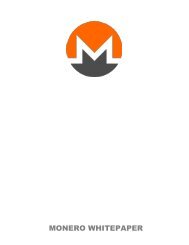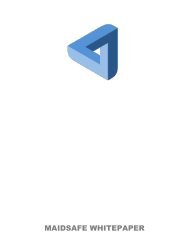Whitepaper - Ethereum Classic With Cover
Create successful ePaper yourself
Turn your PDF publications into a flip-book with our unique Google optimized e-Paper software.
<strong>Ethereum</strong> <strong>Classic</strong> Documentation, Release 0.1<br />
be able to create their own client implementing the open protocol. Anyone should be able to contribute to<br />
network security, and so on. No registration, identification or other preconditions should limit participation.<br />
All such limitations prevent the network from scaling and their enforcement creates centralization risks.<br />
• Neutrality is necessary. It’s important for anyone participating in blockchain-enabled cooperation to be<br />
on an equal footing with everyone else. It doesn’t matter if you wield huge economic power or only a tiny<br />
amount. It doesn’t matter whether you’re a saintly Mother Theresa or a vicious drug dealer. It doesn’t matter<br />
whether you’re a human or a refrigerator. It doesn’t matter what you believe in, what political theory you<br />
subscribe to, or whether you’re a moral or immoral person. A participant’s ethnicity, age, sex, profession,<br />
social standing, friends or affiliations, make or model, goals, purposes or intentions—none of this matters<br />
to the blockchain even a bit. The rules of the game are exactly the same for everyone, period. <strong>With</strong>out<br />
neutrality, the system is skewed towards one set of participants at the expense of others. In that case, it’s<br />
less likely to gain universal acceptance and maximize network value for everyone.<br />
• Immutability is necessary. The blockchain is a truth machine preserving one universally accepted version<br />
of history, one immutable sequence of events. What’s true once is always true, regardless of political or<br />
business interests, and no amount of lobbying can change that. If it’s simply not possible to change history,<br />
then no resources are wasted on the effort. If there are any loopholes at all, then sufficiently motivated<br />
and determined interest groups will exploit them at the expense of others, diminishing network value for<br />
everyone.<br />
• The rules governing the blockchain network are known in advance. They’re exactly the same for everyone<br />
and not subject to change other than with 100% consensus. Yes, it must be 100%. Because any change to<br />
the system’s rules that not all participants freely agree to creates a network split, diminishing network value<br />
for everyone.<br />
It’s impossible to achieve these blockchain characteristics without the system being truly decentralized. If any<br />
aspect of the blockchain system becomes subject to centralized control, this introduces an attack vector enabling<br />
the violation of one or more of the key blockchain characteristics. It may be possible to limit participation (such<br />
as by enforcing AML/KYC rules), thus violating openness. It may be possible to enforce discriminatory policies<br />
(such as by filtering “illegal” transactions), thus violating neutrality. It may be possible to rewrite the history of<br />
events (such as by confiscating or “redistributing” funds), thus violating immutability. Introducing centralized<br />
chokepoints creates a precondition for the introduction of “blockchain intermediaries or controllers” who can<br />
siphon value out of the system at other participants’ expense.<br />
So decentralization is the most important feature of blockchain systems, the one everything else depends on. <strong>With</strong><br />
decentralization, blockchains will come to rule the world. <strong>With</strong>out it, they’ll be “contained” and railroaded into<br />
niche applications.<br />
We decentralists are committed to keeping blockchains open, neutral and immutable. We’re committed to keeping<br />
blockchain systems decentralized. This informs all our actions and positions towards any developments in the<br />
crypto world and beyond. All attempts to violate any of the key blockchain characteristics should be fought.<br />
All changes to a blockchain’s rules that introduce new centralization risks or strengthen existing ones should be<br />
fought. Only developments that are clearly beneficial to decentralization or strengthen the three key blockchain<br />
characteristics should be supported and encouraged. The blockchain revolution won’t be centralized. Let’s make<br />
sure of it.<br />
Onward.<br />
1.1.4 Web 3: A platform for decentralized apps<br />
Many have come to believe that an open, trustless blockchain platform like <strong>Ethereum</strong> is perfectly suited to serve<br />
as the shared “back end” to a decentralized, secure internet - Web 3.0. An internet where core services like DNS<br />
and digital identity are decentralized, and where individuals can engage in economic interactions with each other.<br />
As intended by the <strong>Ethereum</strong> developers, <strong>Ethereum</strong> is a blank canvas and you have the freedom to build whatever<br />
you want with it. The <strong>Ethereum</strong> protocol is meant to be generalized so that the core features can be combined in<br />
arbitrary ways. Ideally, dapp projects on <strong>Ethereum</strong> will leverage the <strong>Ethereum</strong> blockchain to build solutions that<br />
rely on decentralized consensus to provide new products and services that were not previously possible.<br />
<strong>Ethereum</strong> is perhaps best described as an ecosystem: the core protocol is supported by various pieces of infrastructure,<br />
code, and community that together make up the <strong>Ethereum</strong> project. <strong>Ethereum</strong> can also be understood by<br />
1.1. Introduction 7




